Affiliate disclosure: This post may contain affiliate links. Please see our Privacy Policy.
Elderberry syrup is a common immune-boosting home remedy for colds and flus. It can be expensive to purchase, but homemade elderberry syrup is easier than you think.
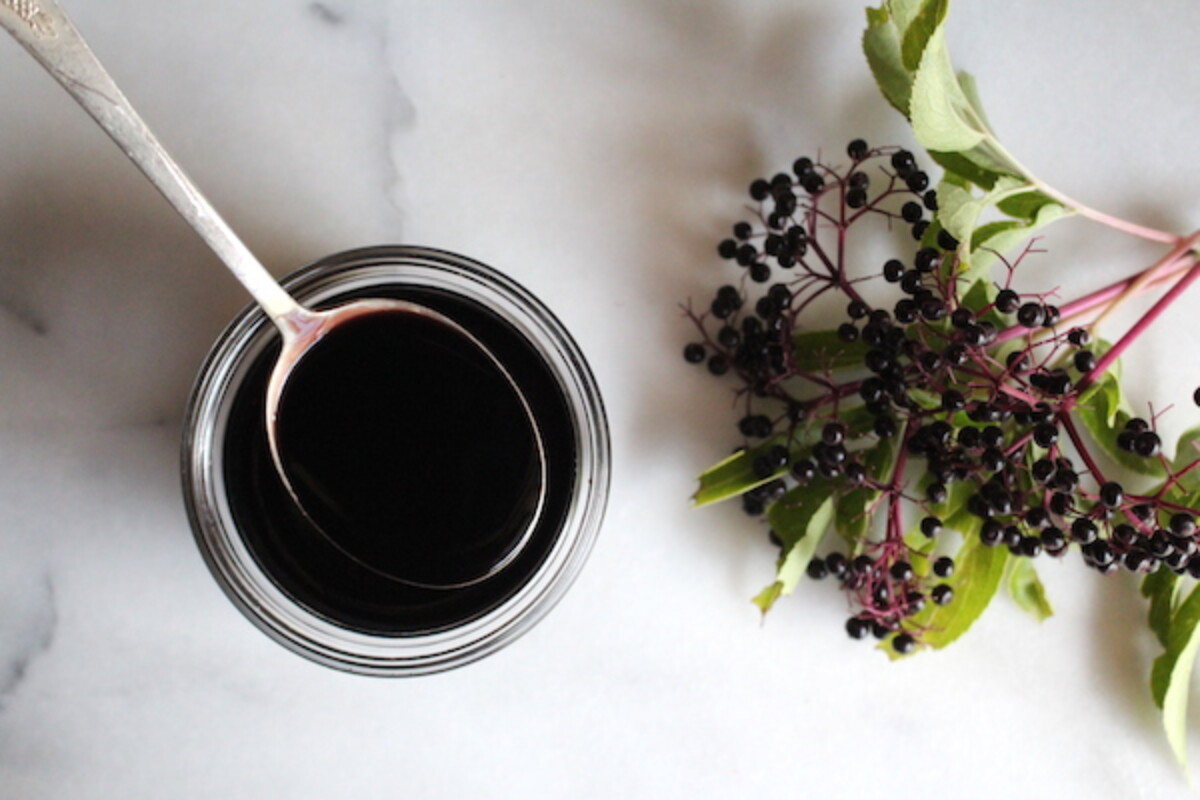
My parents weren’t exactly into doing things naturally when we were kids. We didn’t shop at the farmer’s market or eat health food, and I’d honestly never even heard of granola until I got to college. Even though my upbringing was far from “crunchy,” there was one herbal remedy we always had on hand: Elderberry Syrup.
Why? Our pediatrician insisted on it.
She told my mother that there’s nothing safer, or more effective, for keeping children healthy than elderberry syrup. We’d show up at the doctor, all three of us kids, noses running and with high fevers and our doctor would immediately look to my mother and ask, “Did you forget the elderberry syrup?”
She’d give us prescriptions for antibiotics (as they were handed out a lot easier back them), along with a note reminding my mother to pick up yet another bottle of the all-important elderberry syrup at the pharmacy.
Now that I have my own kids, life is a bit different. We grow our own organic food on our Vermont homestead, herbal remedies are our first line of defense and my kids have never yet been prescribed antibiotics. Still, elderberry syrup is our go-to remedy that gets our family through cold and flu season.
These days though, instead of picking up sambucol at the store, we make our own homemade elderberry syrup with raw honey and other immune-boosting herbs.
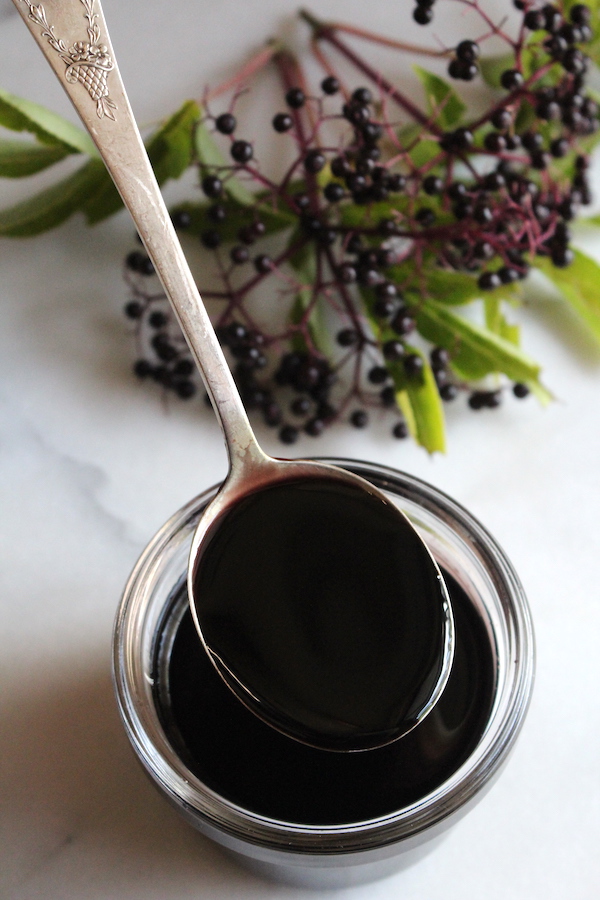
Benefits of Elderberry Syrup
While elderberry has been a folk remedy for centuries, modern science is validating these age-old uses. Studies have found that elderberry syrup can reduce the duration of flus, as well as boost the immune system in both the healthy and sick.
Elderberry Syrup Cold & Flu Treatments
A placebo-controlled study on flu patients found that with a tablespoon (15 ml) of elderberry syrup taken 4x per day, “Symptoms were relieved on average 4 days earlier and use of rescue medication was significantly less in those receiving elderberry extract compared with placebo. Elderberry extract seems to offer an efficient, safe and cost-effective treatment for influenza.”
Another influenza study cooked elderberry syrup into slow-release lozenges, but administered a similar dosage 4x a day. The effects were dramatic…
“The extract-treated group showed significant improvement in most of the symptoms except 24 hours after the onset of the treatment, whereas the placebo group showed no improvement or an increase in severity of the symptoms at the same time point. By 48 hours, 9 patients (28%) in the extract-treated group were void of all symptoms, 19 patients (60%) showed relief from some symptoms… In contrast, complete recovery was not achieved by a single patient in the placebo group [during the 48 hour monitoring period].”
They concluded that “elderberry extract is safe and highly effective in treating flu‐like symptoms.”
Elderberry Syrup For the Immune System
After several studies confirmed that elderberry syrup can shorten the duration of the flu, another study tried to determine the effects of elderberry syrup on a healthy immune system. They found that a commercially available elderberry syrup (Sambucol) substantially increased immune activity, even in healthy people.
“We conclude from this study that, in addition to its antiviral properties, Sambucol Elderberry Extract and its formulations activate the healthy immune system by increasing inflammatory cytokine production. Sambucol might, therefore, be beneficial to the immune system activation and in the inflammatory process in healthy individuals or in patients with various diseases. Sambucol could also have an immunoprotective or immunostimulatory effect when administered to cancer or AIDS patients, in conjunction with chemotherapeutic or other treatments.”
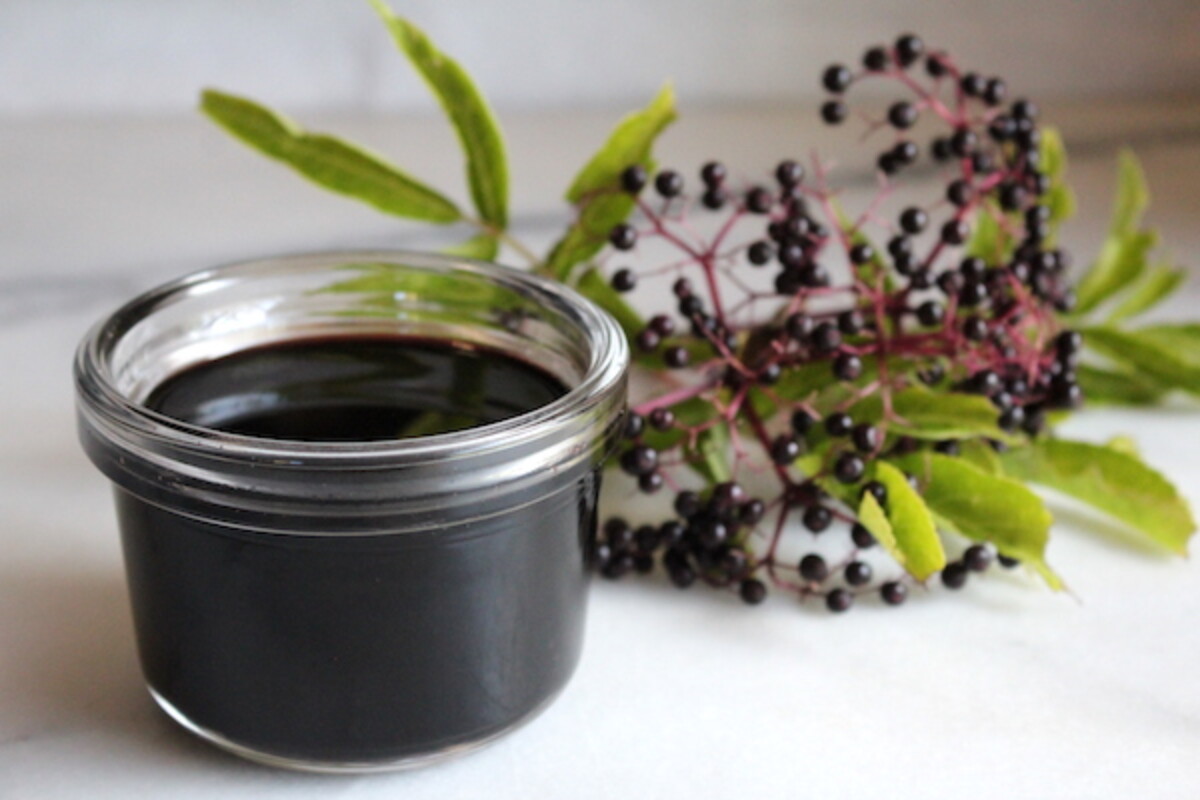
Side Effects of Elderberry Syrup
In general, elderberry syrup is considered a safe natural remedy. That said, there’s always the potential for an allergic reaction.
Other parts of elderberry plants, such as the leaves and stems contain a toxic compound called glycoside, and should not be consumed. There’s also some evidence that raw elderberries contain toxins, and all elderberries should be cooked prior to use. Elderberry syrup is a cooked preparation, which is another reason why it’s so common as a home remedy.
(Others suggest that fermentation also destroys this toxin, so homemade elderberry oxymel, wine and vinegar are generally considered safe. We’re fond of making elderberry mead, which is honey wine.)
Elderberries are mildly diuretic and can interact with prescription “water pills” designed to make you pee more. Additionally, since they’re an immune stimulant, they can potentially cause problems in people with auto-immune disorders.
As with any herbal remedy, it’s best to check with your doctor before starting any new remedy.
Disclaimer: I am not a doctor, nor do I play one on the internet. I love doing research and sharing my findings with others, but I strongly suggest you verify this information with other sources and talk to your doctor.
How to Make Elderberry Syrup
Homemade elderberry syrup can be made from either fresh or dried elderberries. Generally, dried elderberries are used simply because they’re more easily available.
I buy dried elderberries in bulk online, and we probably go through 3-4 pounds a year making various elderberry remedies.
Making elderberry syrup starts with elderberries and water. The amounts are up to you, but I start with 1 cup dried elderberries, add 4 cups water. Keep that ratio the same, using 1 part dried elderberries to 4 parts water, by volume.
Bring the elderberries and water to a boil, and simmer on very low about 30 minutes. Most of the water is going to either evaporate or absorb into the dried berries, but be very careful not to let the pot boil dry.
After simmering, it’s time to strain the mixture. With the pot on very low heat for 30 minutes, I usually get right around 1 cup of very strong elderberry extract after straining. (Save the strained berries, they can still be used a few more times for making cups of elderberry tea.)
The total yield may vary depending on your stove, so measure the strained liquid.
Add 1 part honey for every 2 parts juice. With my elderberry syrup recipe, I have 1 cup juice, so I add 1/2 cup raw local honey.
I generally let the hot elderberry extract cool to room temperature before adding the honey, simply because I want to keep the honey raw and unheated. That’s optional, and you can just dissolve the honey in the hot elderberry extract.
At this point, you have a finished elderberry syrup that can be stored in the refrigerator for 2-3 weeks. Without any preservatives, the syrup must be used relatively quickly.
Making Shelf-Stable Elderberry Syrup
My simple homemade elderberry syrup recipe isn’t shelf-stable, but since it’s quick to make, I don’t really mind. Just keep dried elderberries on hand and I’ve got a fresh batch ready to go in under an hour.
Still, it’s sometimes handy to have fresh elderberry syrup in the medicine cabinet, like when my husband comes home feeling under the weather and wants something to take now before heading off to bed.
Adding alcohol preserves elderberry syrup, but you have to add quite a bit for it to be effective. The mixture needs to be at least 20% alcohol, and some sources say 30%.
To achieve this, you’d have to add an 80 proof liquor (40% alcohol) like vodka at a 1:1 ratio.
What do I do?
I mix homemade elderberry syrup with an equal amount of homemade echinacea tincture. That achieves the 20% alcohol while adding even more immune-boosting herbs.
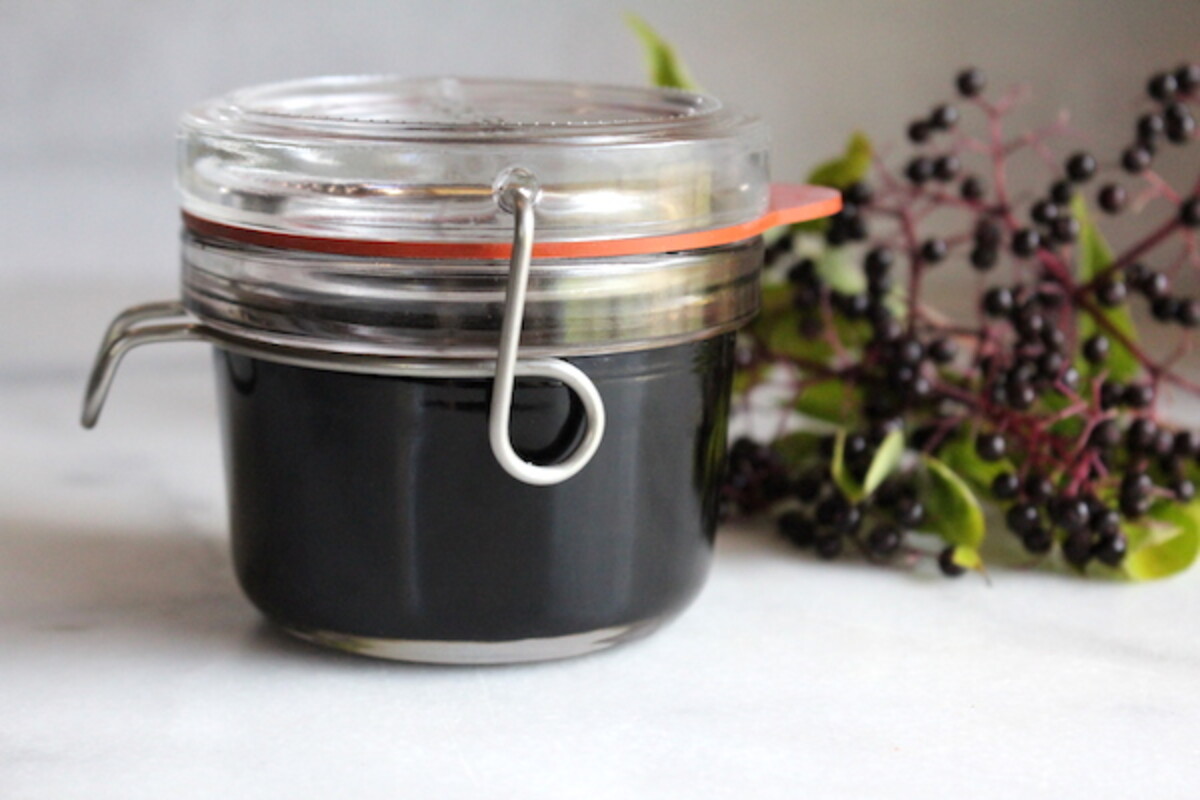
Elderberry Syrup Dosage
The commonly recognized dosage for elderberry syrup is one tablespoon (15ml) taken 3-4 times per day for 3-5 days for adults. Elderberry syrup dosage for children is one tablespoon (15ml) twice daily.
Keep in mind that honey cannot be fed to children under 2 years of age. Their stomach acid is not as strong as adults, and there’s a small chance they could have an adverse reaction to the naturally occurring bacteria in honey. Elderberry syrups made with sugar are more appropriate in younger children.
That said, always check with your doctor for more specific dosages appropriate to your situation.
(And always check with a doctor before giving any medication, herbal or otherwise, to a young child.)
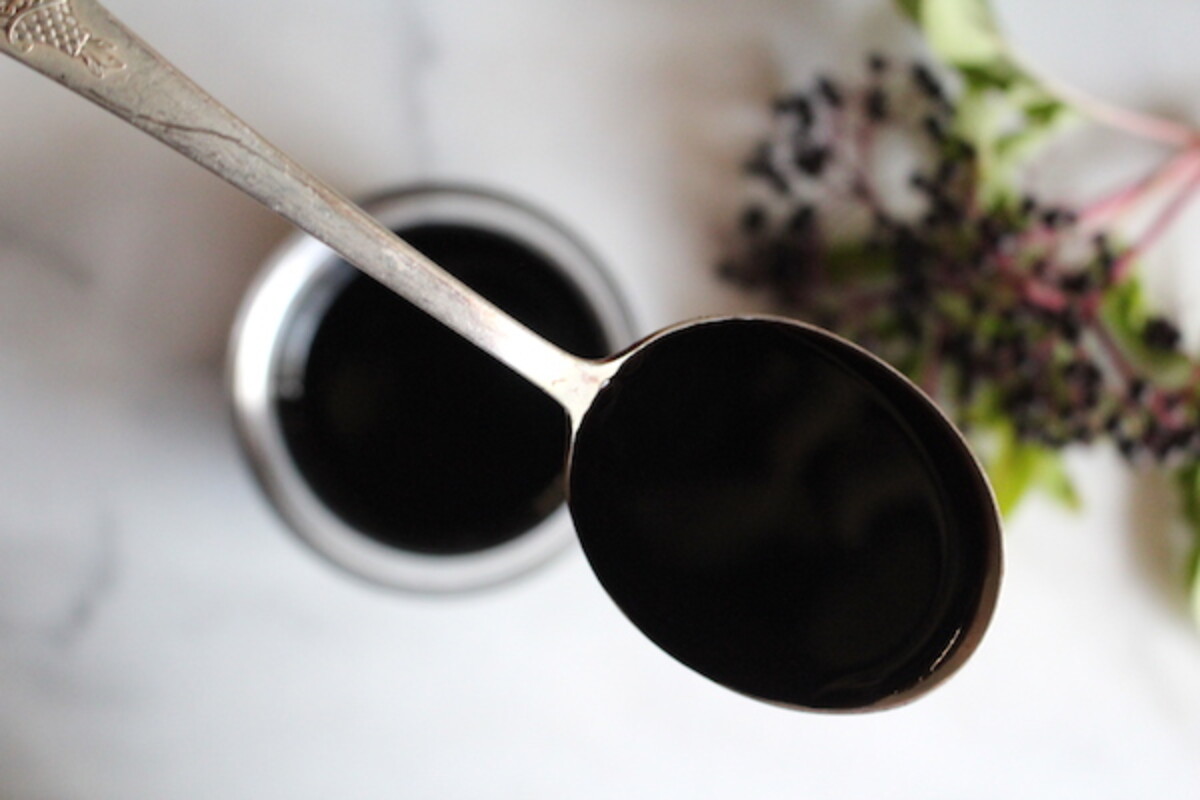
Ways to Use Elderberry Syrup
While you can just take elderberry syrup by the spoonful, it’s a really versatile ingredient that you can incorporate into your diet in other ways.
I like to add 2-3 tablespoons to a glass of seltzer for a refreshing elderberry soda, or using elderberry syrup to sweeten herbal teas.
While I’m fond of our homemade maple syrup, I sometimes pour elderberry syrup over pancakes for an immune-boosting berry-flavored breakfast. It’s also spectacular drizzled over plain yogurt.
A friend of mine uses it to make homemade elderberry lollipops, which are an extra special treat. They’re a bit sweet for my taste, but a good substitution for storebought candy.
My kids are particularly fond of homemade elderberry gummy bears. I think of them as our own tiny, flu-fighting army…
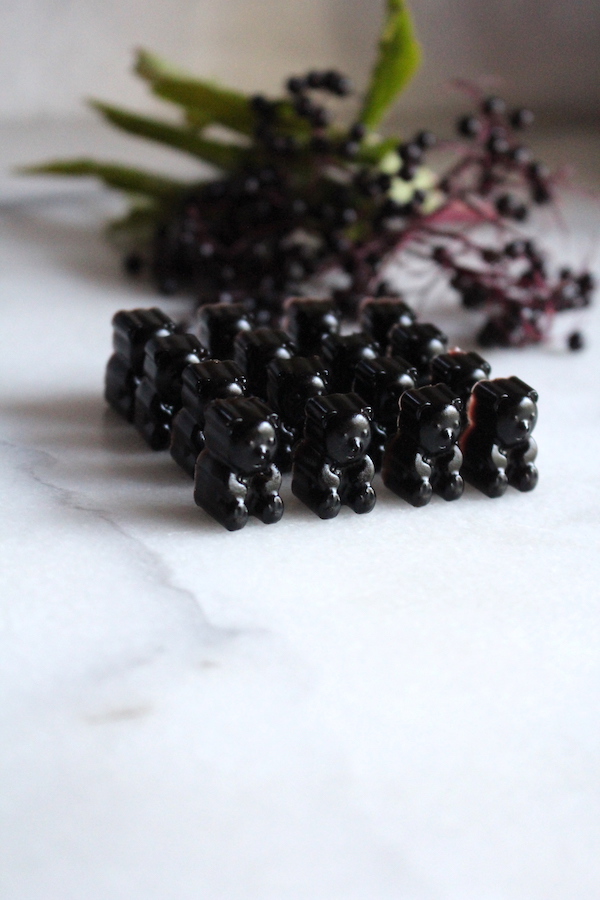
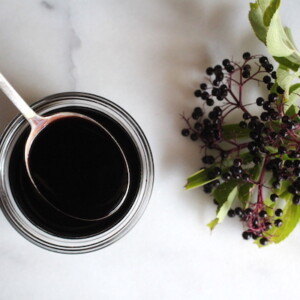
Homemade Elderberry Syrup
Ingredients
- 1 cup dried elderberries
- 4 cups water
- 1/2 cup honey, see note
Instructions
- Add elderberries and water to a saucepan and bring to a low simmer. Heat on low for about 30 minutes, and then remove from heat. (Most of the water is going to either evaporate or absorb into the dried berries. Keep the heat low and be careful not to let the pot boil dry.)
- Strain the elderberry extract through cheesecloth or a fine-mesh strainer. (Save the strained berries, they can still be used a few more times for making cups of elderberry tea.)
- Optional ~ Allow the elderberry extract to cool to room temperature if using raw honey.
- Measure the strained liquid, you should have about 1 cup of elderberry extract.
- Add 1 part honey for every 2 parts juice. With my elderberry syrup recipe, I have 1 cup juice, so I add 1/2 cup raw local honey.
- Stir until the honey is completely dissolved, about 1-2 minutes.
- Store homemade elderberry syrup in the refrigerator and use within 2-3 weeks. (See note to extend shelf life)
Notes
More Elderberry Recipes
Looking for more ways to use elderberries? Try any of these tasty elderberry recipes:
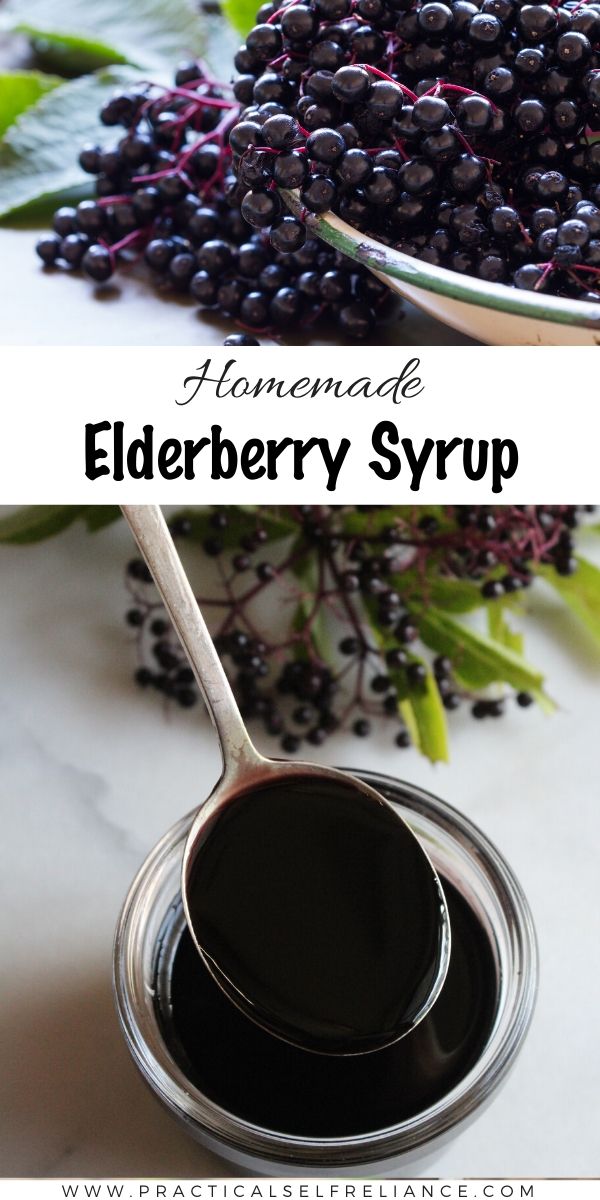
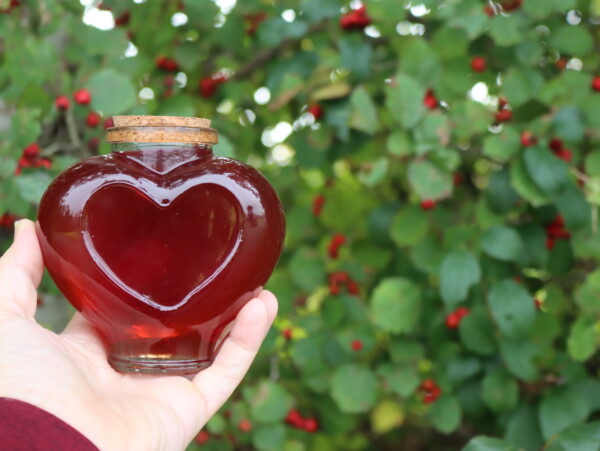
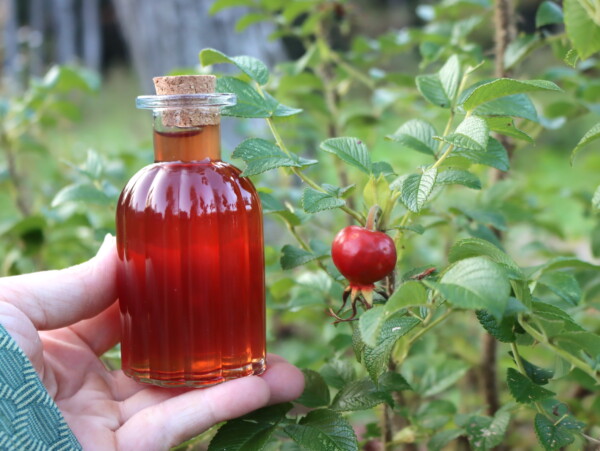
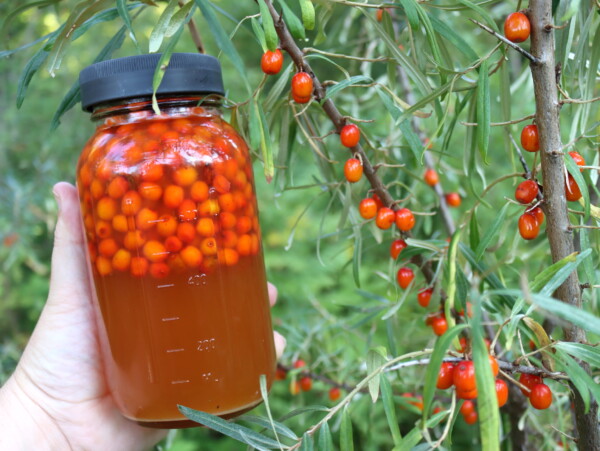
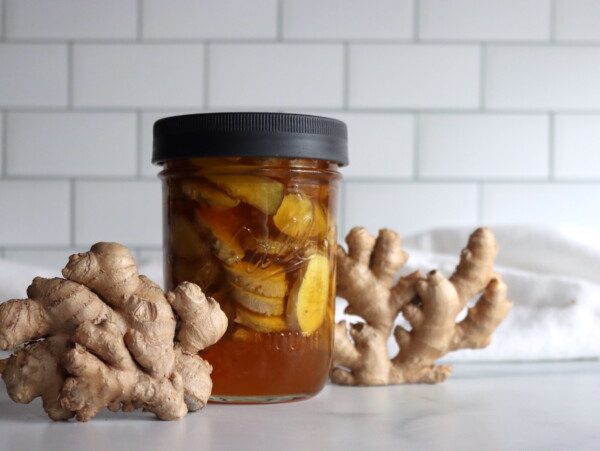





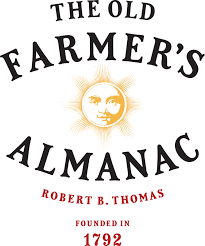

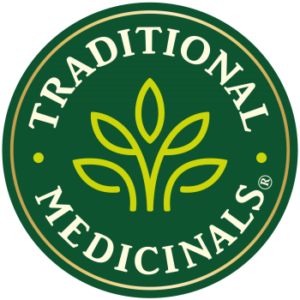


I have a question about saving the leftover berries for using in tea. What would you recommend storage and process wise to use as a tea?
I would dehydrate the berries if you want to use them for tea. You could also keep them in the fridge for a few days or in the freezer.
Thank you!
Instead of alcohol to make this shelf stable, do you think it’d be safe to instead raise the pH with lemon juice as you’d do with canning?
I would just can the juice and then make it into syrup when you’re ready to use it. I would not can it with the honey. You will destroy the beneficial properties by heating the honey during the canning process.
How do you can the juice for later use? What guidelines do you follow?
At this point, there are no safe, tested guidelines for canning elderberry juice or syrup. Try saving them in the freezer instead.
Could you can it? I have done it in the past without the sweetener but not sure if it was ok
Yes, elderberry syrup can be canned.
If i make the syrup with honey, no alcohol, and put it in the freezer to preserve it, will the freezer kill all the benefits?
I think that would be totally fine, and I don’t think it’d impact the benefits.
I’m making my syrup without honey and adding monk fruit after. I’m wondering though if it will not last as long in the fridge without the honey.
That is a good question…The honey (or sugar) is a preservative and keeps it for quite a long time. I know monkfruit is not digestible by humans, but I have no idea if it’s still sugar-ish enough to act as a preservative. (Artificial sugars like stevia or sweet and low wouldn’t preserve at all, but monkfruit is still technically a sugar alcohol I believe…so it may be different.) I’d error on the safe side and make a very small batch to use within 2 weeks in the fridge, as things generally keep about that long before spoiling anyway, and not depend on the sugar to help preserve it longer. Good luck, let me know how it goes!
I will be making this with fresh picked elderberries. What should my water to berries ratio be
I would start with 1 cup fresh elderberries and 3 cups water and adjust to your desired consistency.
I was wondering can the syrup be made in a crock pot
Yup! That should work just fine, just a longer slower extraction of the berries.
I love my elderberry syrup but I usually make a bit more watery version and take it as a strong tea. It goes in a quart bottle in the fridge and sweeten it with manuka. It’s lovely and a quick kick in the immune system’s pants when that system starts to lie down 😉 I keep a Fb page for my herbal shares, my friends say I should write a book but that would require focus and work. I’m happily retired and do not wish to spend excessive time digging ‘n such, there’s a good chance you’ll find links to your ‘stuff’ on that Fb page, if ya don’t mind . . .
This entire post is well done. Pre-Y2K I came into contact there with a very knowledgeable herbalist whose handle was Goat Lady. She very patiently guided this scientific minded, precise measurement guy into a very good understanding about the wide latitude of strengths in herbal concoctions.
Unfortunately she is no longer with us.
If the rest of your herbal medicine related posts are as close to what Goat Lady used to do, then Merry Christmas to me. I’ve found someone to take Goat Lady’s place.
This post = well done.
WolfBrother
Thanks Ashley for your efficient and thorough ideas!
I wondered if the plain boiled down elderberry tincture without the honey would be shelf stable for years? Then could add the honey in at time of use?
Also how long is the alcohol version shelf stable do you guess?
If you want to just make an elderberry tincture by extracting elderberries in alcohol then it is shelf-stable, provided it’s at least 30% alcohol. (You’ll have to do a bit of math for this, and see what proof alcohol you’re using. With dried elderberries it’s pretty simple, with wet ones it becomes a bit more complicated). That’s the easiest way to make it shelf stable. If you’re hoping for something without alcohol, I’d suggest an oxymel (vinegar infusion).
Hi. I have yet another shelf stability question. When you say shelf stable… obviously including the correct ratio of alcohol, must you refrigerate it after opening… or will it be fine in the medicine cabinet? Thank you for such an interesting and informative post.
If you’re doing a tincture, then there is no need for refrigeration either before or after opening. It isn’t being processed and sealed as in a canner so opening it doesn’t affect it at all.
Elderberry syrup is the best for colds and flu! I had never heard of elderberry syrup until about a year and a half ago. I made my 2nd batch ever earlier this fall and I’ve used it to stave off colds. I’ve shared some with friends who have also found it effective. If I feel like I’m coming down with something, I take a Tablespoon of the syrup, and whatever it is is gone. If I feel like the “bug” is trying to dig in, I might take a 2nd dose later, but the “bug” never reaches beyond a scratchy-throat stage. I have not been sidelined by any illness since keeping the elderberry syrup on hand.
That’s wonderful! I’m so glad elderberry syrup works for you! Aren’t natural remedies amazing!? 🙌